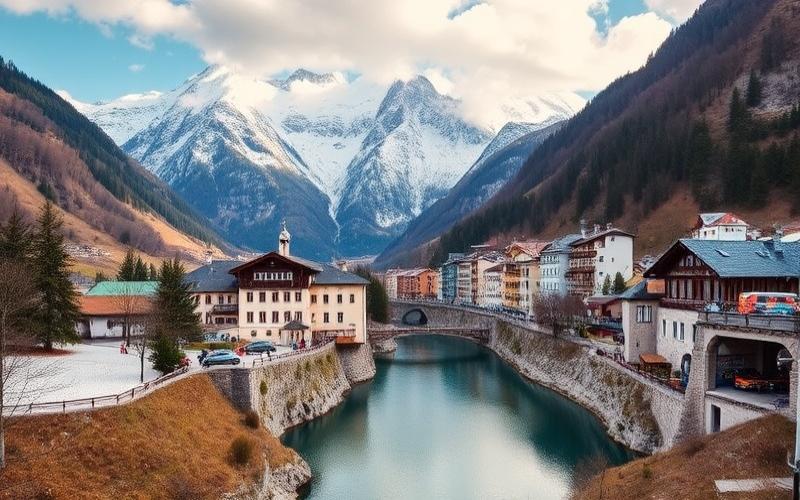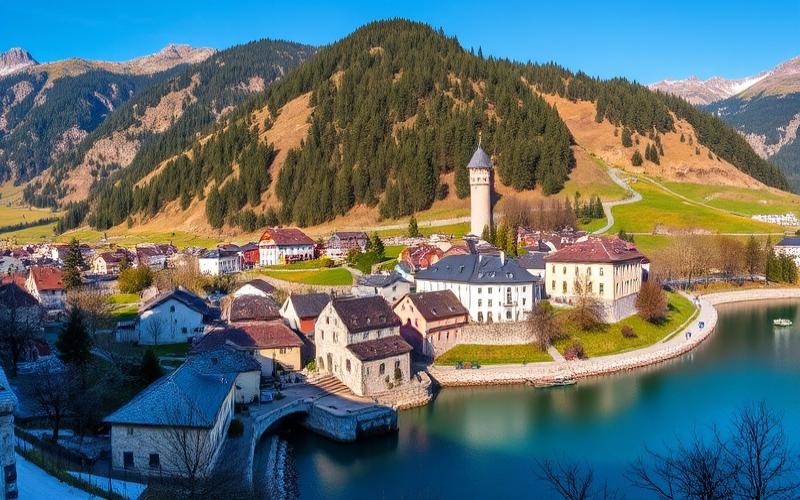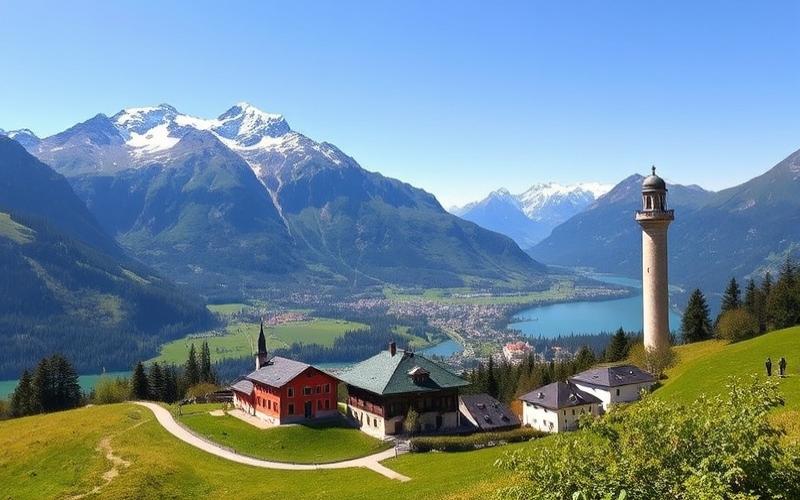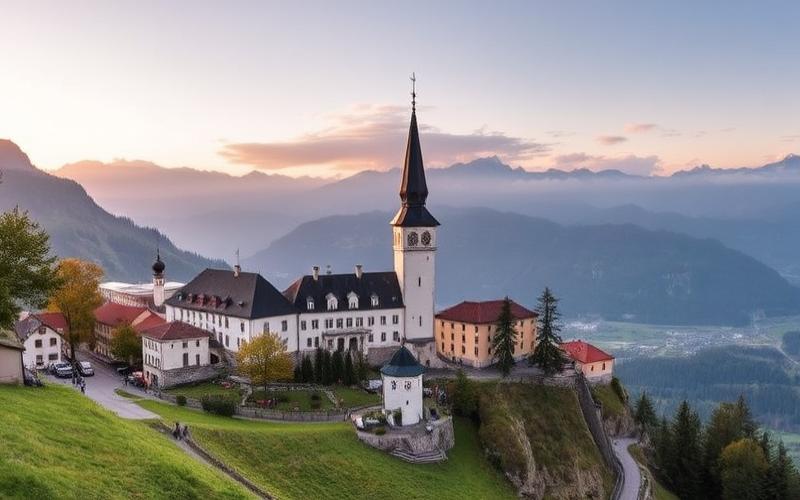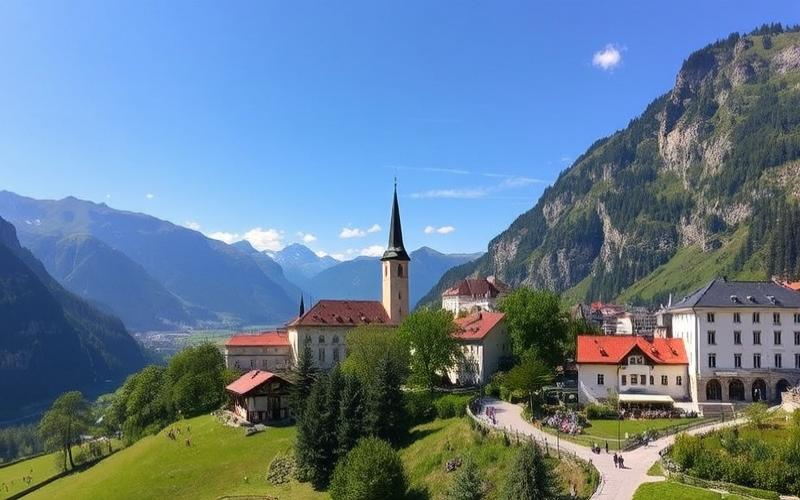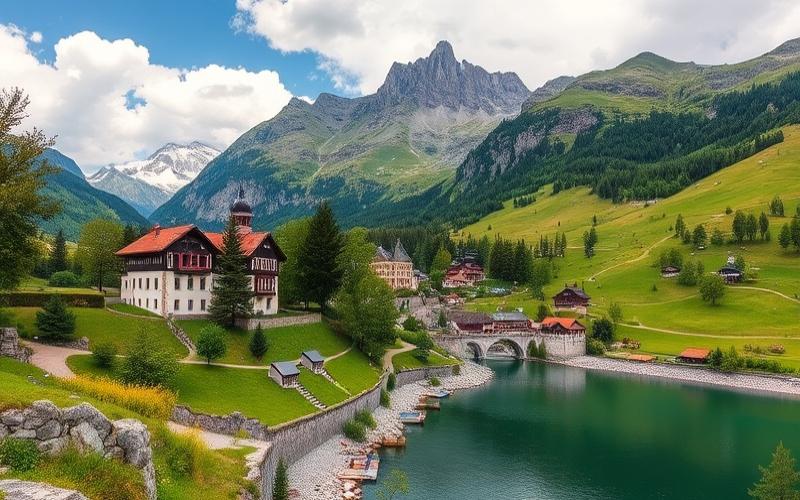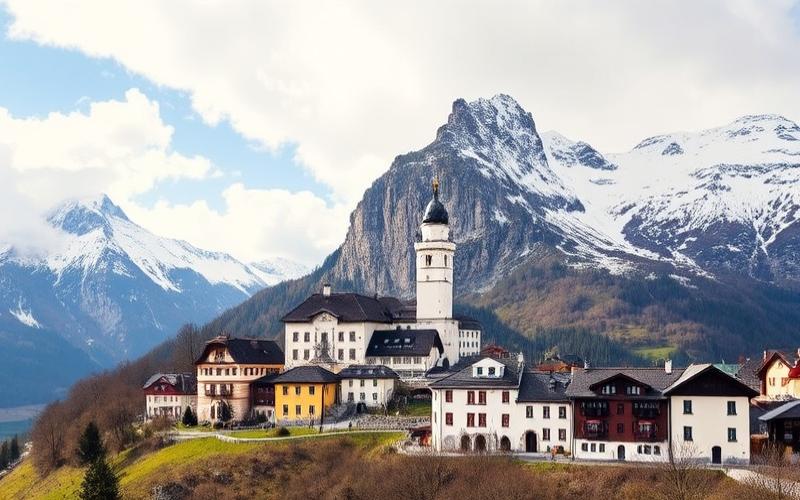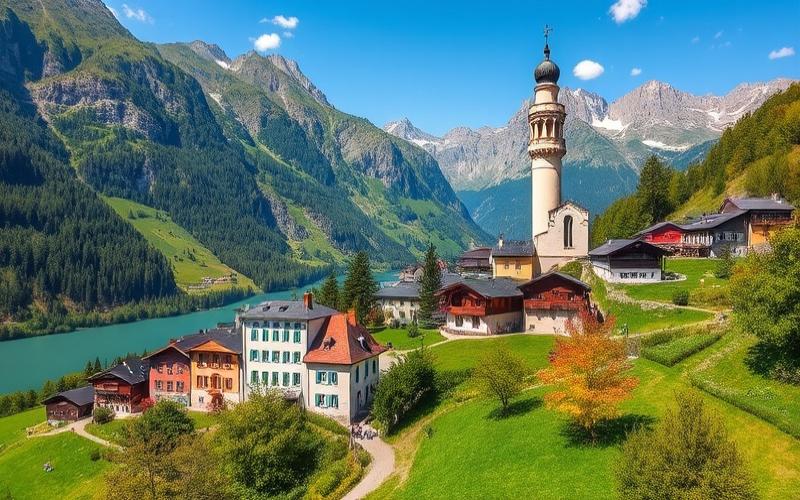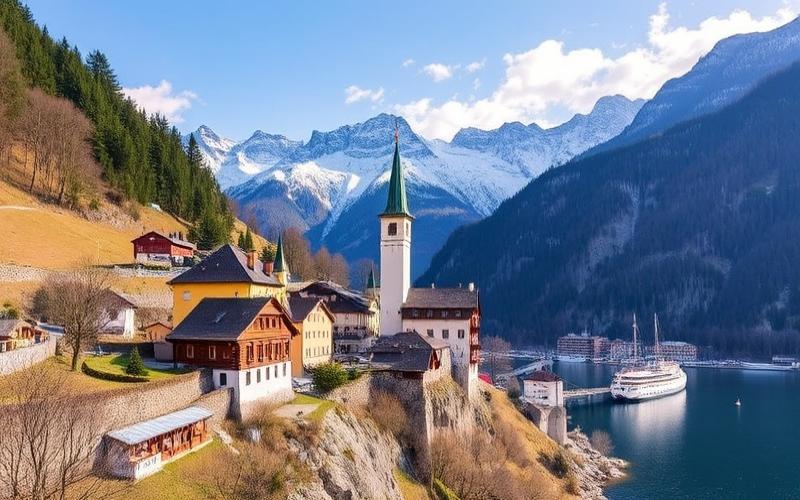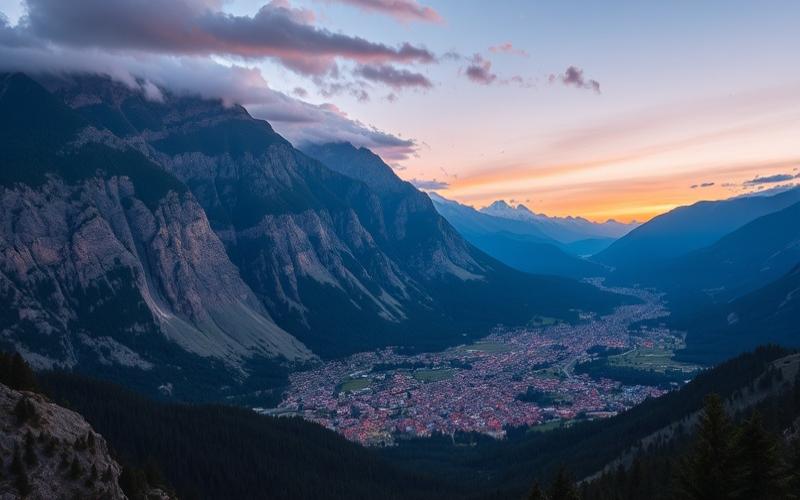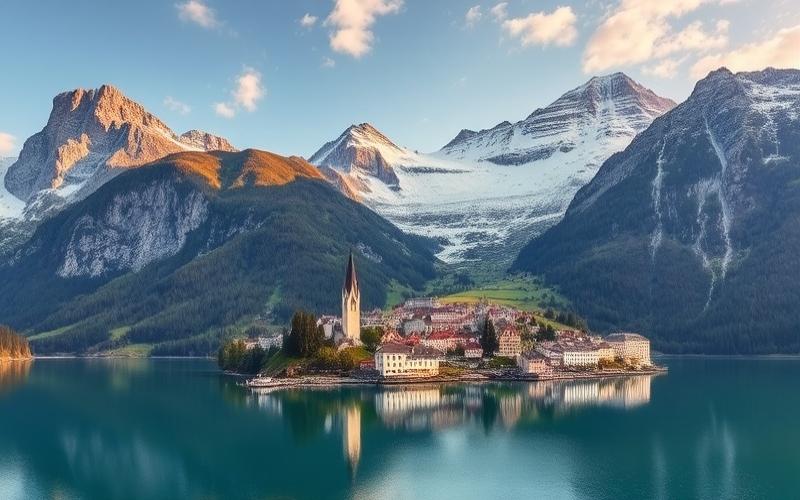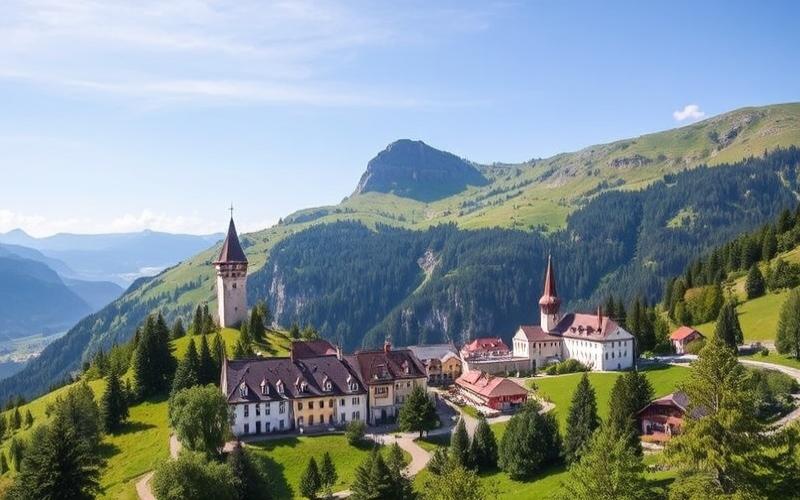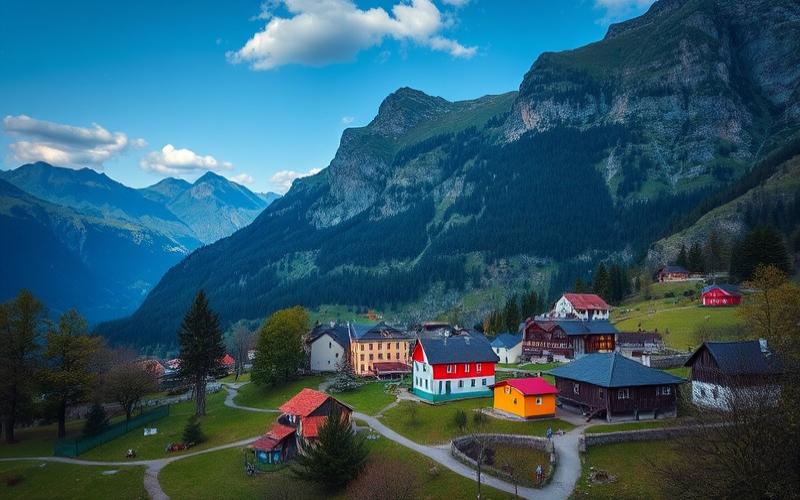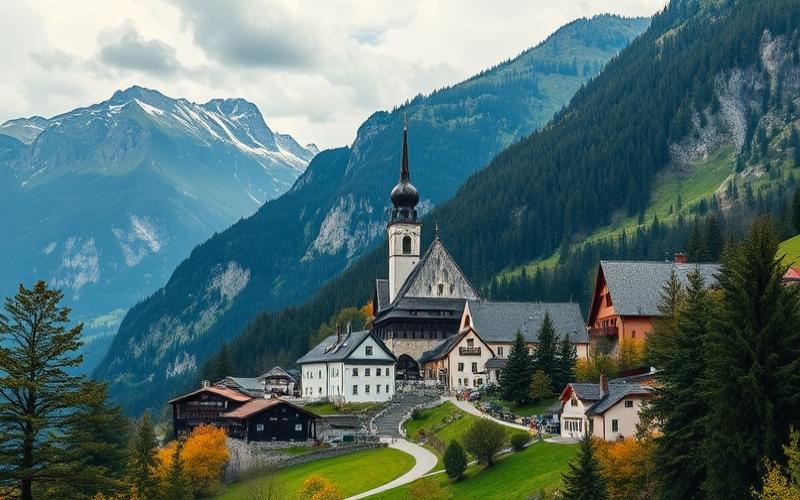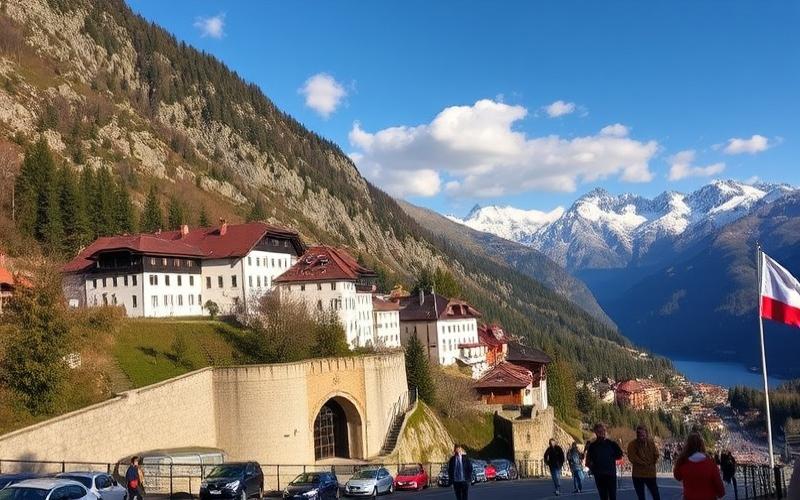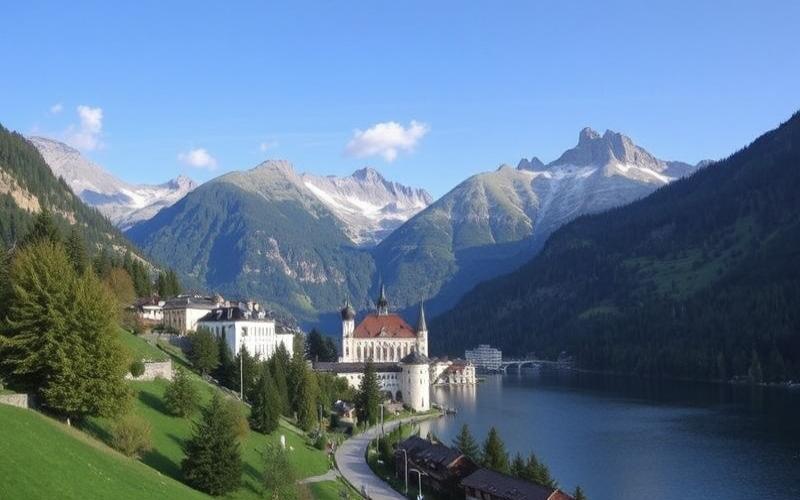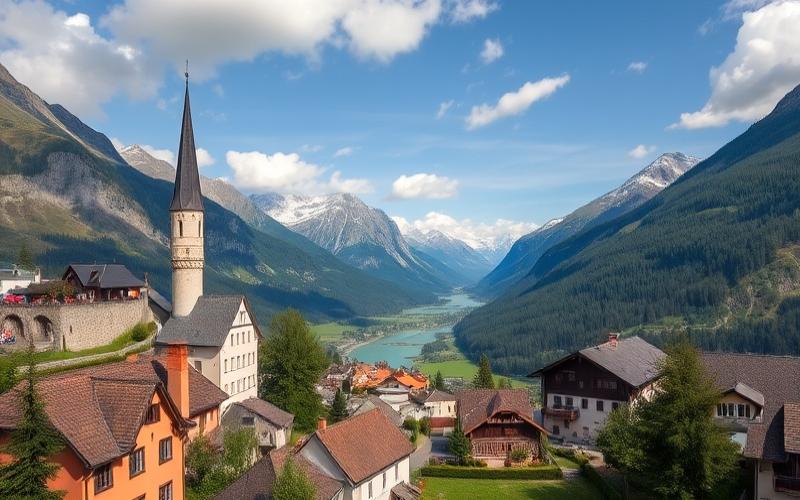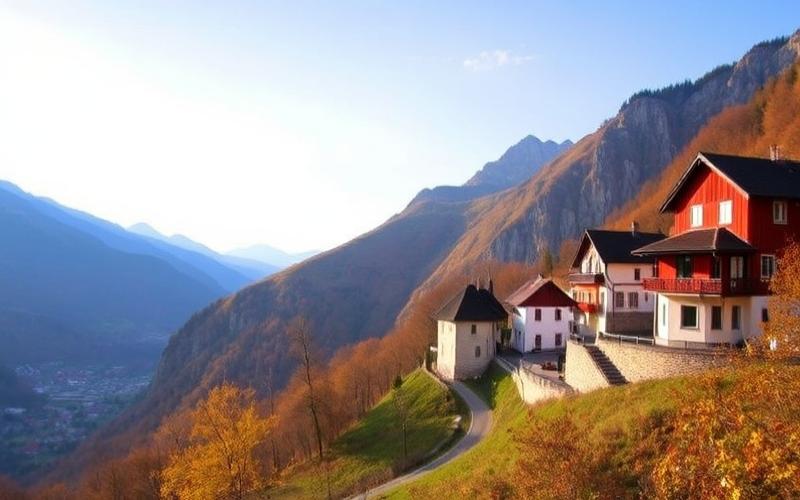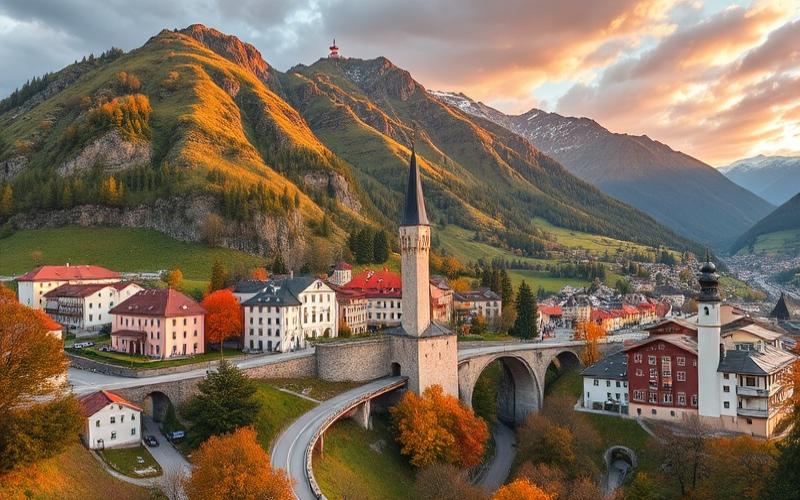
 Published on and written by Cyril Jarnias
Published on and written by Cyril Jarnias
Nestled Between Switzerland and Austria, the Tiny Principality of Liechtenstein
The tiny principality of Liechtenstein holds many surprises for expatriates curious to discover its cultural and spiritual heritage. While religious diversity is modest, with Catholicism predominating, understanding local religious practices becomes essential for integrating harmoniously into this Alpine country.
A Valuable Guide for Newcomers
This article aims to be a valuable guide for deciphering the subtleties of religious ceremonies and holidays, from age-old traditions to contemporary customs, thus enabling newcomers to navigate easily in an environment where religion plays a central role in weaving social and community bonds.
Good to Know:
Liechtenstein is a country where the Catholic religion is very present in daily life and local traditions. Taking the time to understand these aspects will facilitate your integration.
Introduction to Religious Practices in Liechtenstein
The importance of religion in Liechtenstein’s local culture is evident through its historical, social, and institutional role. The majority religion is Catholicism, which holds a predominant place not only in individual beliefs but also in the country’s political and social organization. According to the most recent data, approximately 70% of the population is Catholic, while 8% are Reformed Protestants, 6% are Muslim (mainly from immigration), about 10% have no religious affiliation, and minorities practice Orthodoxy or other religions.
| Main Religion | Estimated Percentage of Population |
| Catholicism | 69-70% |
| Reformed Protestantism | 8-8.1% |
| Islam | 6% |
| No Religion | 9.6-10% |
| Other Religions | ~1% |
The Constitution declares Catholicism as the “State Church” benefiting from state protection. This specificity translates into mandatory religious education (Catholic or Protestant) in public schools—although exemptions are possible—as well as tax exemption for religious organizations.
Historically, this predominance was consolidated by a strong link between the Catholic Church and political power: until 1997, the territory fell under the Swiss diocese of Chur before the Vatican created the independent archdiocese of Vaduz. However, recent decades have seen reforms aimed at limiting this direct ecclesiastical influence on public affairs.
Main Places of Worship Include:
- St. Florin Cathedral in Vaduz
- Several parish churches distributed in each municipality
- Protestant churches
- A mosque for the Muslim community
Annual Religious Events Strongly Structure the National Calendar:
- Major Christian holidays (Christmas, Easter)
- Corpus Christi (“Fronleichnam”), celebrated with public processions
- Assumption (August 15), also a national holiday
- Lent and various local patron saint festivals
In addition to these majority celebrations, there are some holidays specific to Muslim or Orthodox communities; however, their visibility remains limited due to small numbers.
Ecumenical coexistence is marked by a notable absence of interreligious tensions: everyone practices their faith freely thanks to legislation guaranteeing religious freedom while maintaining a framework respectful of historical traditions. Occasional ecumenical initiatives are observed during common events or within charitable associations.
“Religion still serves today as a cornerstone of identity for many residents, structuring not only family rituals but also influencing certain social norms and shared values.”
For Expatriates Living in Liechtenstein:
- They will often notice that some businesses close on religious holidays.
- Local spiritual practices can foster a strong community climate but sometimes require cultural adaptation.
- Mutual respect generally prevails among diverse religious communities; there is no hostility towards newcomers practicing another faith as long as they also observe this local respect.
In summary,
⎡The Liechtenstein religious landscape combines dominant Catholic tradition, progressive openness towards greater religious plurality, and constant valorization of living together⎦
Good to Know:
Religion plays a central role in Liechtenstein’s culture, where about 75% of the population identifies as Catholic, a tradition dating back to the Church’s influence on politics and society over the centuries. Among emblematic places of worship, St. Florin Cathedral in Vaduz is the most symbolic, hosting numerous religious events. Significant liturgical holidays like Christmas and Easter are widely celebrated, accompanied by local customs, while an active ecumenical scene testifies to peaceful coexistence among Christians, Protestants (10%), and small Muslim and Orthodox communities. Openness to different religious traditions influences daily life, where expatriates can observe mutual respect strengthened by shared celebrations like the Liechtstock, a historical procession. Understanding these religious practices helps expatriates better integrate into the social fabric while emphasizing the importance of tolerance and cultural exchanges.
Impact of Religious Holidays on Daily Life
Catholic holidays occupy a central place in Liechtenstein’s official calendar. Virtually all public holidays correspond to religious celebrations, among which Christmas, Easter, and Assumption stand out as highlights of the year. These dates structure the rhythm of daily life: during major holidays, most businesses, administrations, and schools close their doors, thus offering families and local communities the opportunity to gather.
| Holiday | Date | Impact on Daily Life |
|---|---|---|
| Christmas | December 25 | Widespread closures; family gatherings |
| Easter | Variable | School holidays; major religious ceremonies |
| Assumption | August 15 | Official public holiday; community gatherings |
Influence on Culinary and Community Traditions
- Each holiday is accompanied by specific traditional dishes: at Christmas, spiced cookies or gingerbread are often shared; at Easter, painted eggs and brioches are typical.
- Religious ceremonies (solemn masses) rhythm these special days.
- Family or village gatherings are frequent around festive meals or during processions.
Specific Aspects That May Surprise Expatriates
- High participation in religious services even among non-practitioners.
- Near-total quiet in the streets during certain holidays (notably at Christmas).
- The extended duration of festivities: for example, the Easter period sometimes spans several days including Good Friday, Easter Sunday, and Easter Monday.
- Assumption (August 15) coincides with National Day; this double event blends religious fervor and patriotic celebrations.
Social and Cultural Role
Major holidays play a major role in strengthening the social fabric, encouraging intergenerational meetings and oral transmission of local customs. They also contribute to maintaining cultural heritage through regional liturgical songs or artisanal decorations.
Tips for Expatriates Wishing to Participate or Prepare Well
- Inquire about the local calendar to anticipate commercial closures or possible disruptions.
- Accepting invitations to share a family meal during a major holiday is an excellent opportunity to discover the local culture “from the inside.”
- Observe traditions discreetly but respectfully during religious services before any potential active participation.
- Participating in associated public events (processions, festive markets…) quickly promotes warm integration within the neighborhood.
For any newcomer to Liechtenstein, understanding this annual rhythm marked by major Catholic holidays not only facilitates practical organization but also opens the door to an authentic cultural experience at the heart of the local community.
Good to Know:
In Liechtenstein, Catholic holidays such as Christmas, Easter, and Assumption are at the heart of the official calendar, influencing the rhythm of daily life through business and school closures. These celebrations, which can sometimes surprise expatriates with their community character, are opportunities to strengthen social bonds and maintain cultural traditions. For example, at Easter, families gather for meals including traditional dishes like “Ribel” (corn semolina) and create decorated eggs. Beyond religious aspects, these holidays integrate community gatherings, offering expatriates an excellent opportunity to participate, immerse themselves in local culture, and build friendships. It is advisable to inquire with local residents to better understand customs and prepare accordingly to integrate harmoniously into the community.
Behavioral Codes and Adaptations for Expatriates
Expatriates in Liechtenstein must demonstrate respect and adaptation towards local religious practices, primarily marked by Catholic tradition.
Concrete Examples of Behaviors to Adopt or Avoid:
Respect in Places of Worship:
- Adopt modest attire (shoulders and legs covered).
- Speak quietly, turn off your phone.
- Avoid any loud or inappropriate behavior during services.
- Do not photograph without permission or touch sacred objects.
Participation in Religious Events:
- It is possible to discreetly attend certain public ceremonies (processions, patron saint festivals).
- Participate as an observer, without seeking to impose one’s own rituals.
- Respect local rites even if they differ from personal practices.
General Behavior During Religious Celebrations:
- Be discreet about one’s own convictions, especially during sensitive periods like Easter or Christmas.
- Inform oneself about the meaning of holidays to better understand their impact on daily and social life.
| Do | Don’t |
|---|---|
| Wear appropriate attire | Interrupt a religious service |
| Greet the priest/congregation politely | Take photos without permission |
| Ask before entering a church | Eat/drink in a sacred place |
| Inquire about the local religious calendar | Openly criticize the local religion |
Adaptation During Public Holidays and Organization of Public Activities
Catholic traditions strongly influence the official calendar:
- Several public holidays correspond to religious holidays (Christmas, Easter, Assumption…).
- Businesses may be closed during these dates; personal and professional organization must be anticipated accordingly.
- Public events generally avoid any competition with these major events.
Engaging in Respectful Conversation About Religion with Locals:
Best practices for approaching this delicate subject:
- Use a neutral and benevolent tone: “Could you explain this tradition to me?”
- Show genuine interest in local customs without judgment or direct comparison with one’s own culture.
- Avoid any polemical discussion or proselytism; prioritize active listening.
“Liechtenstein guarantees religious freedom while maintaining a strong cultural anchor in Catholicism. Attentive participation in collective rituals is perceived as a sign of respect by residents.”
Visual Summary – Essential Codes for Integrating During Religious Events in Liechtenstein
| Key Principle | Brief Explanation |
|---|---|
| Discretion | Observe more than participate |
| Respect for Calendar | Adapt your schedule |
| Appropriate Attire | Modesty required |
| Open Dialogue | Open but non-intrusive questions |
Adopting these codes not only avoids misunderstandings but also strengthens one’s social legitimacy with local communities.
Good to Know:
In Liechtenstein, expatriates must be aware of the predominantly Catholic religious practices and adapt their behavior accordingly. To foster harmonious integration, it is recommended to participate in local religious celebrations, such as the Federal Day of Repentance and Christmas, keeping in mind the importance of discretion and respect in churches and during masses. Expatriates should avoid any offensive debate about religion and prioritize respectful and informative conversations with residents to better understand their perspectives. Religious holidays strongly impact business opening hours and the calendar of public events, and it is wise to plan accordingly. Attending local religious events may also mean remaining attentive to observing appropriate dress codes and ensuring not to disrupt ongoing rites. By adopting these behaviors, expatriates show respect for local traditions and facilitate their integration into Liechtenstein society.
Resources and Religious Freedoms for Expatriates in Liechtenstein
Overview of Main Religions Practiced in Liechtenstein and Impact on Integration
Liechtenstein is a predominantly Christian country, where Catholicism holds a central place. According to recent data:
| Religion | Approximate Percentage of Population |
| Catholicism | 69.6% |
| Reformed Protestantism | 8.1% |
| Islam | 6% |
| No Religious Affiliation | 9.6% |
| Other | ~1% |
The Catholic majority influences public life (religious holidays, denominational education in schools), which can facilitate the integration of Christian expatriates. However, the growing presence of Muslims and other minorities reflects increased diversity thanks to immigration.
Resources Available for Practicing One’s Faith
Expatriates have several resources to live their religion:
- Catholic churches distributed in all municipalities.
- Reformed Protestant church mainly present in Vaduz and Schaan.
- Mosque for the Muslim community mainly from Bosnian and Turkish immigrants.
- A few small Orthodox or Jewish groups (very limited presence).
- Religious associations offering community support and cultural activities.
There are also ecumenical or interreligious organizations facilitating dialogue and offering a welcoming space for newcomers.
Freedom of Worship: Legal Framework
The Constitution of Liechtenstein guarantees freedom of religion and conscience (art. 37) but expressly designates the Catholic Church as the “State Church,” thus benefiting from particular protection. Other denominations are recognized but do not have the same legal status: they fall under private law whereas Catholicism also benefits from public law.
The government grants tax exemptions to recognized religious organizations; there are few social conflicts related to religion according to international rankings.
Restrictions or Challenges Faced by Expatriates
Although religious freedom is protected in theory, some challenges persist:
Unequal Legal Status
Only the Catholic Church has official status; other groups have a less formal status that can limit their institutional rights (public recognition, funding).
Limited Access to Non-Christian Places of Worship
The restricted number of mosques or temples sometimes makes regular practice outside dominant Christianity difficult.
School Life
Mandatory religious education is centered on Catholicism or Protestantism; however, exceptions are possible after formal request to educational institutions.
Means to Overcome These Obstacles
- Creation of religious associations allowing autonomous organization.
- Temporary sharing of spaces with existing churches in agreement with local authorities.
- Active dialogue with municipalities to open greater access to public infrastructures during important holidays.
Testimonials / Concrete Examples
“As a Muslim expatriate who came to work in Liechtenstein from Istanbul, I found a small close-knit community around our single mosque. Even though we are few here compared to Zurich where I was before, I felt well welcomed by my local colleagues during Ramadan—they were curious without ever being intrusive.”
A Franco-Portuguese couple testifies: “We quickly joined a local parish that also offers some masses in English during certain tourist periods—this greatly facilitated our social adaptation!”
Overall, despite some structural restrictions related to the historically privileged status of Catholicism in the country, daily experience shows a generally tolerant climate, conducive to peaceful coexistence among different religious communities.
Good to Know:
In Liechtenstein, Catholicism predominates, greatly influencing cultural and social events, which can favor the integration of expatriates sharing this faith; nevertheless, this micro-state also offers guaranteed freedom of worship through its constitution, allowing expatriates to freely practice other religions. Churches, mosques, and synagogues, although few, are accessible, and organizations like the Council of Religions offer support to facilitate religious life. However, some expatriates note the challenge of lack of diversity but recommend integrating into local religious communities to compensate for this lack. Testimonials from German and Italian expatriates highlight positive initial adaptation thanks to the benevolence and welcome of Catholic communities.
Disclaimer: The information provided on this website is for informational purposes only and does not constitute financial, legal, or professional advice. We encourage you to consult qualified experts before making any investment, real estate, or expatriation decisions. Although we strive to maintain up-to-date and accurate information, we do not guarantee the completeness, accuracy, or timeliness of the proposed content. As investment and expatriation involve risks, we disclaim any liability for potential losses or damages arising from the use of this site. Your use of this site confirms your acceptance of these terms and your understanding of the associated risks.


